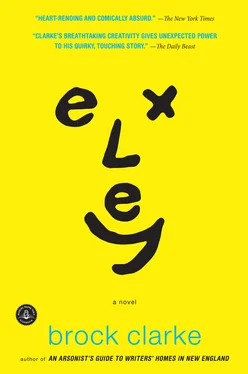This book is dedicated to
Quinn and Ambrose and in
memory of Frederick Exley
(1929–1992).
Though the events in this book bear similarity to those of that long malaise, my life, many of the characters and happenings are creations solely of the imagination. In such cases, I of course disclaim any responsibility for their resemblance to real people or events, which would be coincidental. In creating such characters, I have drawn freely from the imagination and adhered only loosely to the pattern of my past life. To this extent, and for this reason, I ask to be judged as a writer of fantasy.
Frederick Exley, A Fan’s Notes
First session with new patient — M. — and his mother. Just a boy — nine years old — but with an active — active and, indeed, overactive — imagination. M. believes strongly that his father left him (M.) and his (M.’s) mother to join the army and go to Iraq. His mother believes strongly that his father left them, but not to join the army and not to go to Iraq. What is certain is that wherever the father is, he’s no longer in the family home. What is also certain is that the mother is beautiful. So beautiful that for a moment I forget that I’m here to talk to M. and not to look at his mother. When I realize that I’m ignoring my patient, I give myself a stern reprimand, mentally.
“Do you know why you’re here?” I ask M., as I ask every patient in our first session.
“My mother thinks I’m making things up,” he replies. “She doesn’t believe anything I tell her.”
“I just want you to get better, M.,” his mother tells him. “It’s not a matter of who believes who.” Then she turns to me. “Is it?” she asks, and touches my right forearm very gently, with just the tips of her left index and ring fingers. When she removes her fingers, my arm — my arm and, indeed, my arm hair— tingles. It tingles again as I write these words.
“Indeed, no,” I assure M. But I am inclined to believe his mother.
Doctor’s Notes (Entry 1)
Anything Can Be a Beginning As Long As You Call It One
My name is Miller Le Ray. I am ten years old. I was nine years old when my dad went to Iraq, and I was still nine years old eight months later when I found out he was back from Iraq and in the VA hospital. The day I went to see him in the VA hospital was the day I started trying to find Exley. Exley was the guy who wrote my dad’s favorite book, A Fan’s Notes . Mother calls the Exley I eventually found a Man Who Just Said He Was Exley. But I just call him Exley. Because this is one of the things I learned on my own: you need to say things simply, especially when they’re complicated.
So why don’t I begin there: the day I went to see my dad in the VA hospital. Exley’s book begins toward the end, but he calls it a beginning anyway. Because this is one of the things I learned from Exley: anything can be a beginning as long as you call it one.
A Beginning
Iwoke up on Sunday, the eleventh of November, 200–, knowing that my dad had come home from the war. I knew this without anyone having to tell me; I knew it in my bones, the way you always know the most important things. I jumped out of bed and ran into my parents’ room. The bed was unmade and there was no one in it. The room was as empty as the bed. I checked the upstairs bathroom. The faucet was dripping, like always. Before my dad went away, Mother sometimes joked that he was the kind of guy who would join up and go to Iraq just so he wouldn’t have to fix the faucet. After he left, she stopped making the joke. But anyway, the bathroom was also empty. I went back to his bedroom, in case my dad had snuck in there while I was in the other rooms looking for him. But it was empty, too. Then I heard a sound coming from downstairs. It was Mother, crying. Mother never cried. The only other time I had ever heard her cry was when my dad went to Iraq in the first place. This was, of course, how I knew my dad was home: I’d heard Mother crying without knowing I’d heard her crying. When we say we know something in our bones, we mean we don’t know yet how we know what we know. This is what we mean by “bones.”
So I ran downstairs and followed the sound of Mother’s crying, which led me to the bathroom. The door was closed. I went to knock, then almost didn’t. Because it was hard to have an intelligent conversation with Mother when she was in the bathroom. I knew, from experience, that if I knocked on the bathroom door, this is how the conversation would go.
“I’m in the bathroom,” Mother would say.
“What are you doing in there?” I would ask.
“Miller , I am in the bathroom, ” Mother would say.
“I know, ” I would say. “But what are you doing in there?”
But this time was different. It was different because Mother had been crying and I wanted to know why, and my dad was back from the war and I wanted to know where he was. I knocked on the door, and Mother stopped crying immediately.
“I’m in the bathroom,” she said.
“Why were you crying?” I asked. And then, before she could answer, I asked, “Where’s my dad?” Which started her crying again.
I took a step back from the door and thought about what I knew. I absolutely knew my dad was back from Iraq. Except he wasn’t in our house, which he would have been if he’d been able to be in our house. Mother was crying, which she’d never done, as far as I knew, except for that once. All of this was going on in Watertown, New York. Fort Drum is in Watertown. It’s an army fort. I go to school with dozens of kids whose dads and mothers are based at Fort Drum before and after going to Iraq. I knew from them that when their parents left Iraq for Watertown, they went to one of three places. My dad wasn’t in the house — my eyes told me that. My dad wasn’t in the base morgue, either — my bones told me that, just as surely as they’d told me my dad was back from Iraq in the first place. That left only one place where he could be: the VA hospital.
I went upstairs, got dressed, brushed my teeth, walked back downstairs, got Exley’s book from my dad’s study, put it in my backpack, shouldered the backpack, then took a few steps toward the bathroom. The door to the bathroom was still closed, and I could hear Mother still crying behind it, quieter now, but steady, like an all-day rain. Please don’t cry , I wanted to say to her. I’m going to go get my dad and bring him home and everything will be all right. So please don’t cry . But I didn’t think I could say anything like that and not feel ridiculous afterward. I thought of my dad, of what he might say to Mother under these kinds of circumstances. Probably something not exactly comforting, probably something beginning with the phrase “For Christ’s sake.” I didn’t think I could, or should, say that, either. So instead of saying either of those two things, I said, “I’m going to ride my bike,” although possibly not loud enough to be heard over her crying. In any case, Mother kept crying. And so I walked into the garage, where I kept my Huffy, climbed on, and pedaled to the VA hospital.
Doctor’s Notes (Entry 2)
My second session with M. My area of expertise, of course, is the juvenile mind, but perhaps a physical description is in order nonetheless. M. has light blue eyes and red cheeks that suggest either robustness or shame and hair that one might call dirty blond. In M.’s case, the description pertains both to the color of his hair and to its cleanliness. M.’s hair is not long but high and looks as though it has been slept on: it is flat in sections, unruly in others. I can see comb marks and surmise that someone has tried and failed to tame it. I assume that someone to be his mother. Oh, his mother! I somehow restrain myself from asking if she is well, if she’s waiting for him outside in the car, if she has spoken of me since our first session. I can see her in my mind’s eye: her shiny black hair, her eyes so deeply blue that they, too, look black, her angular white face, the total effect being coal placed on a taut pillow. She is as beautiful in memory as she was in my office four days ago. Despite his hair, and despite his tiny teeth (M. can be mature in most ways except for his dentition, which remains entirely infantile), M. is himself what one would call a good-looking kid, although he looks nothing like his lovely mother. I assume he takes after his father.
Читать дальше












